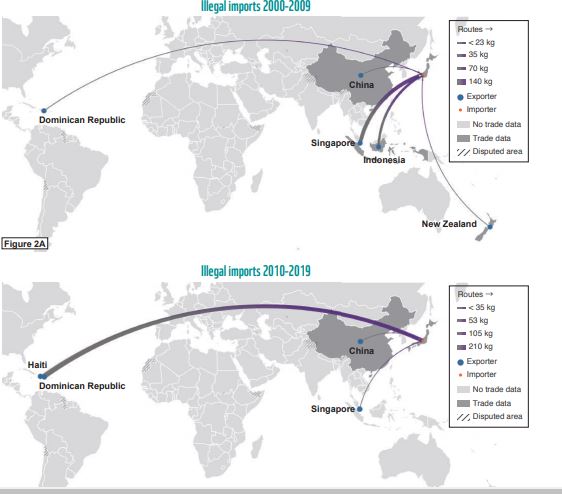Japan is among the countries most involved in the illegal trafficking of Hawksbill turtles, included among the "critically endangered" species in the IUCN Red List
Sea turtles are among the busiest animal species in the world. The laws of the various countries of the world, especially the Asian and Caribbean ones, play a crucial role in their fate. Among these we find Japan, where weak regulation and poor enforcement contribute to fuel the illegal trade in Hawksbill turtle, listed as a "critically endangered" species on the IUCN Red List. The report is sounding the alarm “Shell Shocked – Japan’s role in the illegal tortoiseshell trade”, just published by WWF, TRAFFIC and Japan Tiger and Elephant Fund (JTEF).
“Japan's customs records report 564 kg of Hawksbill turtles seized in 71 incidents between 2000 and 2019, representing around 530 Hawksbill turtles. More than half was seized between 2015 and 2019 alone, ”the report reads.
Hawksbill turtle: an endangered species
But why is this species so threatened? The shells of these sea turtles have a beautiful design and due to their particularity they are often used to make different ornaments known in Japan as bekko. The international trade in Hawksbill turtles was banned in 1977 by the Convention on International trade in Endangered Species of wild fauna and flora, but some states such as Japan have established a formal reserve to maintain active international trade.
Only in 1994 Japan agreed to formally respect the ban on international trade, but even today in this country the manufacturing industry and the domestic trade of turtles can continue to operate legally, using only the "stocks" that existed before the end of the imports.

@TRAFFIC.org
Read also: Nearly 200 baby giant tortoises were found wrapped in plastic and hidden in a suitcase in the Galapagos
Too weak legislation
According to various estimates, the stocks of products derived from turtles should have been completely exhausted by some time; however, the newly published document reveals that they would still be available today: according to a 2017 inventory, of the 188,4 tons of raw shells reported to the Japanese government in 1995, 28,7 tons still remained, or 15%.
But WWF Japan, Traffic and JTEF point out that:
"The government's rare spot checks, continued use of turtle shells, and their links to active manufacturing industry raise serious doubts that reported stocks truly reflect pre-1993 turtle shell stocks."
The main problem with turtle trafficking is still too weak legislation.
National legislation is mainly based on manufacturers self-declaring their transaction records and stock balances and exempts most turtle shell products (except specimens or whole shells - the hard top shell of turtles) from registration requirements. - explains Tomomi Kitade Deputy Head of the Wildlife Group of WWF Japan - Our 2019 snapshot survey of the main online auction platforms detected more than 8.200 sales of Hawksbill turtle products (both unused and second-hand) for a total value of approximately 102 million yen or close to one million US dollars. However, less than 1% of these sales fell under national law, leaving the rest as de facto unregulated legal trade given the lack of rules governing the trade in finished products.
The report just published was created not only to disclose the numbers of the illegal trafficking of Hawksbill turtles, but also to ask Japan to intervene with effective measures to protect these extraordinary animals, still threatened today despite being at risk of extinction.
The report explicitly calls for "strengthening inventory control and internal trade regulations and enforcement of the law" and "introducing a ban on online sales of turtle shells by e-commerce companies to eliminate the unregulated domestic trade, in which products of illegal origin are likely to enter.
Fonte: TRAFFIC
Read all our articles on turtles:
- Nearly 200 baby giant tortoises were found wrapped in plastic and hidden in a suitcase in the Galapagos
- If you find a beached turtle (dead or alive), don't put it back into the sea. Call 1530!
- Turtles hidden in a closet, pet shop owner denounced
- Turtle, the animal of resilience: legends and symbolic meaning


























